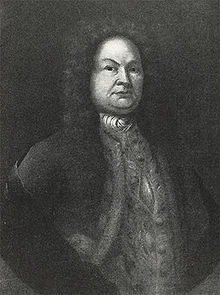Gunno Dahlstierna
Gunno Dahlstierna (September 7, 1661 – September 7, 1709) was a Swedish poet.

Biography
Gunno Dahlstierna whose original surname was Eurelius, was born in the parish of Ör (now part of
A dissertation read at
Dahlstierna's patriotism was touching in its pathos and intensity, and during his long periods of professional exile he comforted himself by the composition of songs to his beloved Sweden. His genius was most irregular, but at his best he easily surpasses all the Swedish poets of his time. His best-known original work is Kungaskald (Stettin, 1697), an elegy on the death of Charles XI. It is written in
Works

The works of Dahlstierna have been collected by P. Hanselli, in the Samlade Vitterhetsarbeten af svenska Författare från Stjernhjelm till Dalin (Uppsala, 1856, &c.).[2]
Editions
- Elektron (in Latin). Leipzig: Johann Georg. 1687.
Notes
- ^ Chisholm 1911, pp. 733–734.
- ^ a b c Chisholm 1911, p. 734.
References
- This article incorporates text from a publication now in the public domain: Chisholm, Hugh, ed. (1911). "Dahlstjerna, Gunno". Encyclopædia Britannica. Vol. 7 (11th ed.). Cambridge University Press. pp. 733–734.
